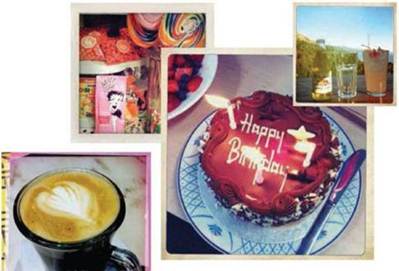…Whether it’s pastries in bed or sex
with younger man, we asked three writers to share the one thing that really –
really – cheers themup
“Food as become a symbol of my happiness”

Award-winning
writer and journalists Laura Barton on learning to love food after
beating an eating disorder
Sunday morning we sat in bed, air steeped
with fresh coffee, fingers buttery with patisserie. I turned on the radio,
opened the newspaper and bit slowly into my pain au chocolat; tongue alive
suddenly with sugar, fat, and warm, sweet chocolate. I chewed, I swallowed, I
licked my lips. I basked in this moment of pure happiness. Flakes of pastry
fell lightly on to the covet cover.
A little over a decade ago, this would have
been unimaginable to me. Back then, I was 21 and in the throes of an eating
disorder that had begun three years earlier. Lolling in the bed eating pastries
was a preposterous notion at a time when my only indulgence was the occasional
spoonful of jam, followed by much guilt and regret and self-loathing.
Like most sufferers of eating disorders I
had my own fuzzy logic, my list of good and bad foods. I would permit myself to
eat dried dates and fat-free yogurt, pickled beetroot and Brazil nuts, apples,
oranges, grapefruits and tomatoes. On good days, I would eat a slice of Marmite
on toast (no butter) for every meal; for a short while I tried to live on half
a banana a day.
My body ached, my stomach gnawed, my bones
clunked when I walked. For all the satisfaction I found in my jutting hips, my
visible ribcage, I was distressed by starvation’s effect on my brain: my quick
wit, my humour, my ability to concentrate had all been replaced by a thin,
grimy fog. The world seemed a grey and colourless place, and I was lost in its
nothingness.
And yet I ploughed on with my calories
restriction, cutting back in the curious belief that one day I would arrive
somewhere – at a point or a place where I wouldn’t have to do this any longer.
A place where I could be magically slender but not hungry, I place where I was
beautiful, content and perfectly happy.
I have no idea how long this might have
continued had my auntie not died. The numbness I had experienced for the
previous few years was thrust aside by a great barrelling grief. A flood of
feeling returned to my body, and with it came the realisation that life is
short and rich and valuable, that it should not be squandered in unhappiness,
that I had a responsibility to taste life to the full.

Recovering from eating disorder is not an
easy process. It took a long time to release the tight control I had kept on my
food intake. For a while, I maintained a fear of chips, pasta, bread, and a
furious desire to drink alcohol that was fuelled, I suspect, by both my body’s
desire for calories and the subconscious knowledge that in my boozy haze I
might relax enough to eat a bowl of Weetabix.
Four years ago, I realised I had to change
my relationship with food. I wasn’t so much a process of looking my own enemy
in the eye as recognising food as a source of great happiness. Where I used to
spend time storing up information about calorific content and fat percentages,
I learned to value the things I ate for their nutrition, their healing
properties, or simply how good they can make you feel. I relished seaweed,
rainbow chard, kale, but I never denied that some days nothing can beat a good
dark chocolate mousse.
I taught myself to cook, to appreciate food
– how it is grown and prepared and flavoured. I allowed myself to wallow in
taste and texture, delighting in avocados, fresh bread, and frangipane. I would
wax lyrical to you about the delight of young buffalo mozzarella pressed up
against ripe peaches and mint, with just the fainted drizzle of oil and lemon
and orange blossom honey. I could tell you the best way to bake a rose and
pistachio cake with crystallised rose petals and scented cream fraîche.
In the years since, food has become, to me,
an embodiment of life’s richness and a symbol of my own happiness. I look back
in my younger self – timid, restrained, afraid to taste life, to embrace it,
and I think how far I have come, how much deeper, brighter and more vivid my
world is now. I mourn the years wasted, the dishes uneaten, but I am thankful
for what I have now; for the taste of sweet pastry on a Sunday morning, for the
sugar on my tongue and the butter on my fingers, and even for the crumbs in the
bed.